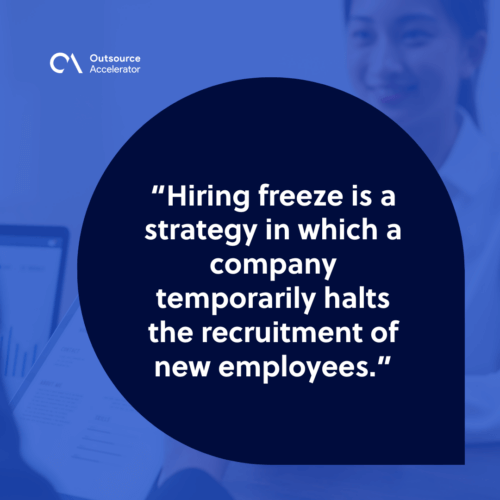Defining hiring freeze and ways to address it effectively

The global business environment is ever-evolving, and companies must continually adapt to a multitude of economic and internal factors.
These adaptations can manifest in various strategies, some of which may significantly impact an organization’s workforce and operational dynamics.
Hiring freeze is one strategy that has become increasingly relevant in today’s economic climate, yet its implications and nuances are often misunderstood.
In this article, we will explore hiring freeze and the underlying causes driving its implementation. We’ll also share effective approaches for organizations to navigate this challenging scenario.
Stay tuned as we unravel the complexities and provide insights into managing this critical business decision.
What is hiring freeze?
Hiring freeze is a strategy in which a company temporarily halts the recruitment of new employees. This decision is typically made in response to many aspects, internally and externally.
During a hiring freeze, the company may suspend filling open positions, including those created by employee departures or retirements. It aims to control costs and stabilize the organization’s financial health without resorting to layoffs or other more drastic measures.

7 Common causes of hiring freeze
A hiring freeze can be a critical measure for organizations, often implemented to maintain financial stability and operational efficiency.
These factors can prompt a company to halt new hiring temporarily:
Economic downturn
During periods of economic recession or financial instability, organizations may experience decreased revenue and increased uncertainty.
To mitigate risks and manage costs, companies might impose a freeze on hiring to conserve resources until the economic climate improves.
Budget constraints
When an organization faces budget cuts or financial constraints, it may need to limit expenditures. Implementing a hiring freeze helps reduce payroll costs and aligns spending with the available budget.
Internal restructuring
Companies undergoing mergers, acquisitions, or internal restructuring might pause hiring to reassess staffing needs.
This allows them to reorganize their workforce and ensure that new hires align with the revised organizational structure and goals.
Decline in business demand
A drop in demand for products or services can lead to reduced workload and revenue. In such cases, a hiring freeze helps manage surplus labor and prevents overstaffing, which can strain financial resources.
Strategic review
Organizations might implement a hiring freeze during periods of strategic review or evaluation.
A pause allows leadership to analyze current workforce capabilities, identify gaps, and develop a comprehensive talent management plan.
Regulatory or policy changes
Changes in government regulations, labor laws, or industry standards can impact an organization’s hiring practices.
A hiring freeze provides time to adapt to new requirements and ensures compliance without incurring additional costs.
Cost-cutting measures
In efforts to improve financial performance, companies may adopt cost-cutting measures that include hiring freezes. This strategy helps control overhead expenses and redirect funds to critical business areas.
Understanding these common causes helps organizations and employees better navigate the challenges and opportunities that arise from a hiring freeze.
8 Ways to address hiring freeze effectively
Effectively dealing with hiring freeze requires strategic planning and adaptive measures to ensure business continuity and employee morale.
Here are some ways businesses can navigate a freeze in their hiring activities successfully:
Optimize existing workforce
During a hiring freeze, it’s crucial to maximize the productivity of the current employees. This can be achieved by cross-training staff to handle multiple roles.
It not only improves skill sets but also ensures that critical tasks are covered despite the lack of new hires.
Prioritize critical projects
Focus on high-impact projects and essential functions that drive the core objectives of the business.
By allocating resources to the most critical areas, companies can maintain operational efficiency and meet key goals without additional personnel.

Enhance internal communication
Open and transparent communication with employees about the reasons for the hiring freeze and its anticipated duration helps in managing expectations and maintaining morale.
Regular updates and forums for employee feedback can foster a supportive and collaborative work environment.
Invest in employee development
Use this period to invest in training and development programs. Enhancing employees’ skills can lead to increased productivity and better job satisfaction.
It also prepares the workforce for future growth once the hiring freeze is lifted.
Leverage technology
Implementing technological solutions and automation can compensate for the lack of additional manpower. Tools that improve efficiency, streamline workflows, and reduce manual tasks can help maintain productivity levels during a hiring freeze.
Review and adjust workloads
Regularly assess and adjust workloads to ensure that no employees are overburdened.
Implementing flexible work arrangements and redistributing tasks can help balance the workload and prevent burnout.
Outsource non-core functions
Consider outsourcing non-core functions to third-party providers. This allows the business to focus on its primary activities while managing costs and maintaining service levels without hiring new staff.
Monitor financial health
Continuously monitor the financial health of the organization to make informed decisions about the duration and extent of the hiring freeze.
Regular financial assessments can help in determining when it’s feasible to resume hiring.
By implementing these strategies, businesses can effectively navigate the challenges of a hiring freeze, ensuring that operations remain smooth and employees stay motivated and engaged.







 Independent
Independent




